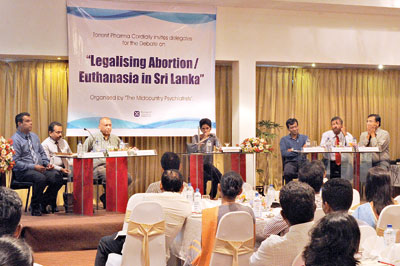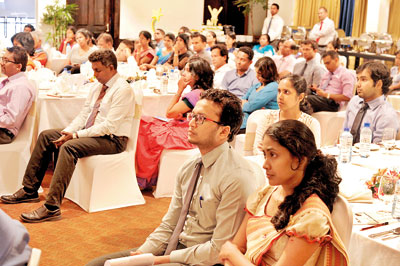News
Docs thrash out pros and cons of abortion

On the floor for the debate on abortion: Moderator Prof. Varuni de Silva flanked by the Proposing Team (on left) comprising Leader Dr. Kalyana Rodrigo, Dr. Sardha Hemapriya and Dr. Induwara Gooneratne and (on right) Opposing Team comprising Dr. Shehan Williams, Dr. Jayan Mendis and Dr. Sajeewana Amerasinghe. Pix by Amila Gamage
The hills of Kandy came alive, not with the sound of music, but with arguments and counter-arguments on two major and controversial but timely issues surrounding life and death.
Abortion and euthanasia, were the burning topics discussed in ‘friendly’ debates by doctors that took up the whole morning of Wednesday, in an event organised by the forward-thinking ‘Mid-country Psychiatrists’ at the Tourmaline Hotel.
At the end of the debates, the jury was still out, like in the country, and no clear verdict issued on whether abortion and euthanasia should be legalized.
“We, the Mid-country Psychiatrists, meet once a month to discuss teenage pregnancies, plight of the Sri Lankan male etc. Abortion and euthanasia have been in the air for awhile,” said Senior Consultant Psychiatrist Dr. Ranil Abeyasinghe based in Kandy, pointing out that politicians don’t touch these issues. “It’s a political graveyard and ordinary people don’t want to hear it. So it is our duty to debate these topics and carry forward these issues, with reason and science prevailing.”
Explaining that there are tests to identify foetal abnormalities, he asked what could be done if such tests were positive. Affluent parents will go to Singapore and get abortions performed but the other parents went home with the babies who have such abnormalities.
Lauding the efforts of Consultant Psychiatrist Dr. Gihan Abeywardena attached to the Kurunegala Hospital and his team for seeing to all the behind-the-scenes arrangements for the debates, Dr. Abeyasinghe said the ‘Mid-country Psychiatrists’ were an informal group drawn from Kandy, Nuwara Eliya, Mahiyanganaya, Kurunegala and Nikaweratiya.
Thereafter, two groups of six doctors each locked horns to hotly debate abortion and euthanasia moderated by Prof. Varuni de Silva and Prof. Raveen Hanwella, both Professors in Psychiatry at the Colombo Medical Faculty, respectively.
While a majority of the debaters were Psychiatrists including two from Australia, the exceptions were an Obstetrician & Gynaecologist, an Anaesthetist and a Forensic Specialist from other medical fields and a Psychologist from the non-medical arena.
The first debate on ‘The woman should have the legal right to abortion in Sri Lanka’ then took off. The pro-abortion (proposing) team comprised Leader and Consultant Psychiatrist Dr. Kalyana Rodrigo from Canberra, Australia; Consultant Obstetrician and Gynaecologist Dr. Sardha Hemapriya of the Kandy Teaching Hospital; and Senior Lecturer in Forensic Medicine Dr. Induwara Gooneratne of the Peradeniya Medical Faculty. The anti-abortion (opposing) team comprised Leader and Consultant Psychiatrist/Senior Lecturer in Psychiatry Dr. Shehan Williams of the Ragama Medical Faculty, Kelaniya University; Consultant Psychiatrist Dr. Jayan Mendis of the National Institute of Mental Health, Angoda; and Consultant Psychiatrist Dr. Sajeewana Amerasinghe of the Tangalle Base Hospital.

The audience listening intently to the debates
The pro-abortion team put forth the view that as people can decide when to have a child, the choice whether to terminate a pregnancy should not be taken out of the woman’s hands. Dr. Kalyana Rodrigo with his hand on his heart asked the audience whether they would decide on the sanctity of life of the foetus if their mothers, wives or daughters were raped and the morning-after-pill did not work.
“The choice should be the woman’s and we need to support her, whatever decision she takes, whether to terminate the pregnancy or bring up the child,” he said, adding that life began four billion years ago, but human life has been around only for 2.5 million years.
We have grandiose ideas and have endowed ourselves with human rights, he said, adding that in the bigger scheme of things, however, bacteria are more important than humans.
Dr. Rodrigo also argued that nothing is black and white, there should be a case-by-case decision on abortion and for that Sri Lanka should have enabling legislation to let the woman decide.
This is while Dr. Sardha Hemapriya elaborated along with disturbing photographs the suffering of mothers-to-be when the foetus has serious issues such as anencephaly when the brain is not developed, the foetus has its organs developing out of its body or when there are genetic abnormalities. “We can detect abnormalities through tests such as amniocentesis but there is no law allowing termination. If we can terminate such pregnancies at around 11 to 13 weeks we can alleviate much suffering for the mother,” he said.
Currently, around the world there are seven causes which would permit the termination of a pregnancy. They are: To save a woman’s life; to preserve a woman’s physical health; to preserve a woman’s mental health; in the case of rape or incest; because of foetal impairment; for economic or social reasons; and on request. Sri Lanka allows termination only ‘to save a woman’s life’ but we need to consider several other causes which merit a termination, he urged.
Referring to the fact that many maternal deaths are due to serious heart conditions, Dr. Hemapriya said heart disease and several other illnesses such as pulmonary hypertension are conditions in the medical world which are contraindications for pregnancy. If the pregnancy continues, the mother will die and as such termination is the only option.
Dr. Induwara Gooneratne said that anti-abortionists were stuck between assumption, fiction and reality. If the argument is that people should resort to contraception as against abortion, everyone is aware about the failure of contraception sometimes.
He also spoke at length on how science has not yet solved the problem of when life actually starts in the womb and the law must decide on pragmatic evidence.
Reiterating that abortion is happening in Sri Lanka under trained and untrained hands, Dr. Gooneratne said that when the woman is given the choice by law her safety would be ensured.
This is also an issue affecting the poor, he said, adding that when a rich woman needs an abortion she can go to Singapore and get it done, but the poor woman has to face the burden of bearing the baby, feeding the baby and also taking care of the baby.
He asked whether any woman who is the victim of rape, gang-rape or incest would want to have a baby from that terrible, life-changing experience.
| Contraception answer to killing helpless foetusPointing to a beautiful image of a foetus in the womb, the anti-abortion team leader Dr. Shehan Williams strongly defended the right to life of that “innocent little, helpless and voiceless” being with the potential of becoming like all those in the room that day.“Contraception is the answer to abortion,” he said, stressing that abortion is about human rights and this is why the sanctity of life needs to be given consideration.Allowing the woman to make the choice of abortion is a male chauvinist way of washing the hands off the issue and getting the woman to do the dirty work and not taking responsibility for not using a condom. “We allow life to be destroyed but we are not ready to take the responsibility,” said Dr. Williams. “How can we teach our children about murder if we allow a foetus throbbing with life to be killed,” he asked, adding that there is evidence of a silent scream from the foetus when the vacuum goes in and takes its life. What of the sanctity of life? As human beings, we need to protect human kind. Countering the argument that his team was against sex, Dr. Williams was quick to point out that they are not against love. “We don’t ‘condemn’ it, but say ‘condom’ it,” he said, drawing much laughter. Abortion will lead to selections, leaving only the Usain Bolts (the Jamaican sprinter considered the fastest man) of this world alive or members of a super race, said Dr. Williams citing the Nuremburg Trials (held to bring Nazi war criminals to justice for crimes against humanity). “Do we want to go down that path?” He added that the law is simplistic and the legal framework can be manipulated. Any decision on abortion should be built-up on common values, ideals and rights. Dr. Jayan Mendis pointing out that they were not talking about a few percent of foetal abnormalities or women with certain medical conditions who have been told not to conceive, said that just because contraception use could not be promoted, the answer should not lie in killing off normal foetuses. In Sri Lanka, he said, there is a claim that there are 650 abortions a day. Are all these abortions performed on foetuses with anencephaly or congenital heart disease? They are performed on well-formed normal foetuses. A foetus is a living, complete human being. This is why abortion is wrong. Foetuses can feel pain, Dr. Mendis reiterated, asking why the decision to terminate should be left only to the mother. What about the father? Then it should be the decision of both. He was adamant that abortion, also called foetal homicide or foeticide, will reduce people’s respect for life and abortion should not be made a substitute for contraception. “It’s immoral to kill the unborn child for convenience,” he said, quoting the Hippocratic Oath which all doctors swear by that “nor will I give a woman a pessary to procure abortion”. Dr. Sajeewana Amerasinghe, meanwhile, pointed out that induced abortion causes depression in a woman and can lead to an increased suicide risk. Abortion is associated with mental health issues. Citing the case of India, he said that for every legal abortion there were 10 illegal abortions. Sex-selective abortions of female foetuses became worse in both India and Nepal. Quoting studies in Sri Lanka, he said that contraceptive use was only 16.3% among women undergoing unsafe abortions, while 29% had repeat abortions. He argued that an improvement in the women’s educational level was the most important factor and not the legal status of abortion. “The way to reduce illegal abortion is to improve sex education, increase contraceptive knowledge and availability, promote adoption and empower single mothers by reducing stigma, promoting their continuation of education and also providing flexible working hours and financial support,” added Dr. Amerasinghe. |
(Next: Spotlight on euthanasia)

